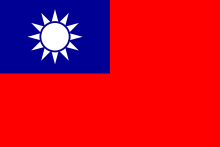Taiwan

Taiwan, officially the Republic of China (ROC), is a country in East Asia. The Republic of China, originally based in mainland China, now governs the island of Taiwan, which constitutes more than 99% of its territory, as well as Penghu, Kinmen, Matsu, and other minor islands, following its loss of the mainland China territory in 1949 in the Chinese Civil War. This remaining area is also constitutionally called the "Free area of the Republic of China" which is not ruled by the Communist Party of China in Beijing. Neighboring states include the People's Republic of China (PRC) to the west (mainland China), Japan to the east and northeast, and the Philippines to the south. Taiwan is one of the most densely populated countries in the world. Taipei is the seat of the central government, and together with the surrounding cities of New Taipei and Keelung forms the largest metropolitan area on the island.
Quotes
[edit]C
[edit]- Taiwan is a good global citizen.
- Chen Chien-jen, as quoted in "Taiwan: Pariah and Poster Child" (18 May 2020), by Jay Nordlinger, National Review
- I made a mistake. I'm so, so sorry for my mistake. I'm sorry, I'm sorry, I'm very sorry. You have to understand I love and respect China and Chinese people. I'm sorry.
- John Cena, in apology on Weibo for referring to Taiwan as a "country" in an interview promoting Fast & Furious 9 on TVBS
- Taiwan is part of the sacred territory of the People's Republic of China. It is the sacred duty of all the Chinese people, including our fellow Chinese in Taiwan, to achieve the great reunification of the motherland.
E
[edit]- We gladly recall on this occasion the Treaty of Mutual Defense between the Republic of China and the United States. We pay tribute to the indomitable spirit of free China which, tested so often in recent years by invasion and war, has once again been demonstrated in the face of Communist attack. We recognize that the sacrifices of free China contribute to the survival of freedom everywhere. We extend our sympathy and friendship to all the Chinese people, being deeply conscious of the hardships and denials of freedom that so many of them are enduring.
- Dwight D. Eisenhower; Exchange of Messages Between the President and President Chiang Kai-shek on the 47th Anniversary of the Founding of the Republic of China Online, The American Presidency Project; 12 September 1958
F
[edit]G
[edit]H
[edit]I
[edit]K
[edit]- Taiwan is not a vital Australian interest. We have no alliance with Taipei. There is no piece of paper sitting in Canberra which has an alliance with Taipei. We do not recognise it as a sovereign state – we’ve always seen it as a part of China... My view is Australia should not be drawn into a military engagement over Taiwan, US-sponsored or otherwise...
- Paul Keating (former Australian prime minister), 'It would make a cat laugh’: key moments from Paul Keating’s National Press Club appearance, The Guardian (November 10, 2021)
- On this occasion we recall vividly the long, arduous struggle Free China has waged under your valiant leadership against foreign aggression and Communist tyranny and for the realization of the noble aspirations of Dr. Sun Yat-Sen. Our alliance, based on ties of historic friendship and unity of purpose, has withstood the tests of the past. May it grow ever stronger in the years ahead.
- John F. Kennedy; Message to President Chiang Kai-shek on the 50th Anniversary of the Chinese Revolution Online, The American Presidency Project; 9 October 1961
M
[edit]- On Formosa, the government of the Republic of China has had the opportunity to refute by action much of the malicious gossip which so undermined the strength of its leadership on the Chinese mainland. The Formosan people are receiving a just and enlightened administration with majority representation on the organs of government, and politically, economically, and socially they appear to be advancing along sound and constructive lines.
N
[edit]- It is hard to think of a state less deserving of pariah status than Taiwan: a country that evolved from dictatorship to become a splendid example of liberal democracy in a region sorely in need of such an example.
- Jay Nordlinger, "Taiwan: Pariah and Poster Child" (18 May 2020), National Review
P
[edit]- There is only one China. Taiwan is not independent. It does not enjoy sovereignty as a nation, and that remains our policy, our firm policy.
- Colin Powell, Interview with CNN (27 October 2004), as quoted in "Warnings by Powell to Taiwan Provoke a Diplomatic Dispute" in The New York Times (28 October 2004).
- We want to see both sides not take unilateral action that would prejudice an eventual outcome, a reunification that all parties are seeking.
- Colin Powell, On Chinese and Taiwanese relations, in interview with Phoenix Television of Hong Kong (27 October 2004), as quoted in "Warnings by Powell to Taiwan Provoke a Diplomatic Dispute" in The New York Times (28 October 2004).
T
[edit]External links
[edit] Encyclopedic article on Taiwan on Wikipedia
Encyclopedic article on Taiwan on Wikipedia The dictionary definition of Taiwan on Wiktionary
The dictionary definition of Taiwan on Wiktionary Media related to Taiwan on Wikimedia Commons
Media related to Taiwan on Wikimedia Commons Works related to Portal:Taiwan on Wikisource
Works related to Portal:Taiwan on Wikisource
- "The Fourth Industrial Revolution in Taiwan: Science Without Conscience?" by Daniel Y. C. Lee

